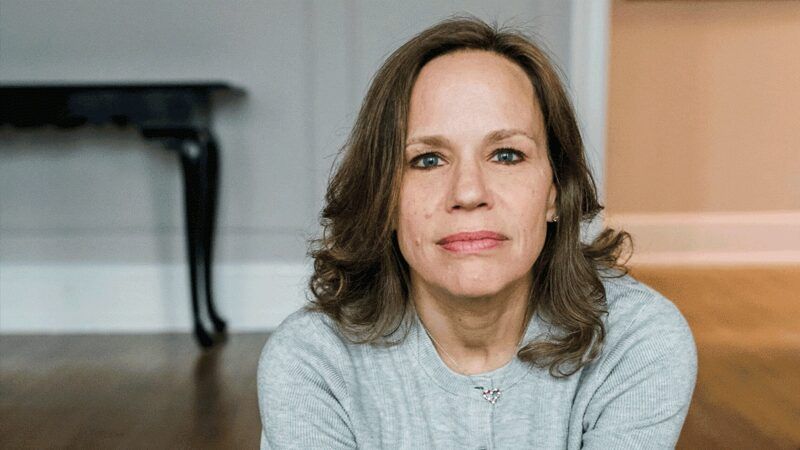Jennifer Sey Keeps Getting Canceled for Speaking Up
"I think the Democratic Party has severely underestimated how many people like me there are," says the 1986 USA Gymnastics national champion.

In 2008, Jennifer Sey was subjected to a vicious backlash after the 1986 USA Gymnastics national champion released Chalked Up, the first memoir published about rampant abuse in the sport. Her new book, Levi's Unbuttoned: The Woke Mob Took My Job but Gave Me My Voice, feels like a continuation of that story, detailing Sey's ouster from the jeans juggernaut—where she was set to become its first female CEO—after she again ruffled feathers earlier this year. This time she wasn't speaking out against abuse in sports; she was speaking out against COVID-19 school closures.
In November, Reason's Billy Binion interviewed Sey by phone about what led to her new book—and why the lifelong Democrat is now politically homeless.
Q: You were one of the first people to speak out in detail about the abuse in gymnastics. It wasn't received well. How do you relate that experience to your experience speaking out on school closures?
A: After [former U.S. women's gymnastics physician] Larry Nassar's arrest, the gymnastics community sort of reassessed and then coalesced around me, kind of pretending that they always had. Which was not the case, but I welcome anyone to the fight. I kept reminding myself that when you say a hard thing that people don't want to hear, the response can be, "You're lying." But ultimately the truth does win out in the end.
Q: Do you feel that's happened here?
A: I think the truth has come out in that there does seem to be a consensus that schools were closed too long and that there were tremendous harms done. But there doesn't seem to be any acknowledgement or accountability that someone made these choices. To some extent, USA Gymnastics had to own its mistakes. I think that's the piece that's missing now with school closures. We have not reached the acknowledgement and accountability phase that this was a policy choice informed by public health, made by local government leaders, influenced by teachers unions.
Q: How do you reconcile those things: that a consensus was reached in your favor but that you still lost your career?
A: The response from Levi's has typically been that they supported my open schools advocacy but didn't support my pushing back on public health. Those two things are contradictory. It's word games, really. But I'm not the great tragedy in this situation; it's the kids who are. And so what I'm most committed to is continuing to push forward on normalizing free speech and open debate and dissent. Because if we had been able to have a public conversation about the harms of school closures, I feel like we could've reached a very different decision and opened schools sooner. That's not what happened.
Q: You were a Democrat for 30 years. You now say you're politically homeless. How does that feel, and how do you respond to those who say that you must be a Republican now because you're not a Democrat?
A: I think the Democratic Party has severely underestimated how many people like me there are: lifelong Democrats who watched as their basic rights just to move freely and send their kids to school were taken away for over a year, which seems to me the most undemocratic thing I can fathom. I didn't register as a Republican. I have issues with both sides. The idea that if you talk to someone then you automatically hold all of their beliefs is ludicrous. And that kind of defines this moment for me.
Q: What do you think people most get wrong about you?
A: That I've somehow been red-pilled and now I'm this alt-right, QAnon conspiracy theorist. I very logically challenged and questioned policies that have now been proven to be incredibly harmful. I stayed true to what I thought the Democratic Party stood for. I don't think I've changed.
This interview has been condensed and edited for style and clarity.
This article originally appeared in print under the headline "Jennifer Sey Keeps Getting Canceled for Speaking Up."


Show Comments (149)